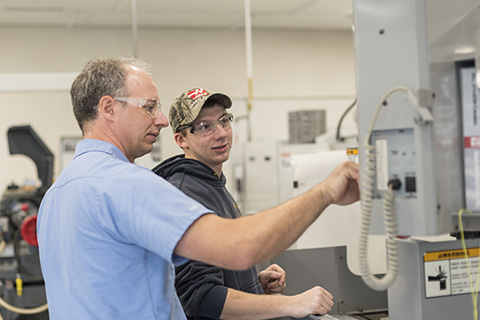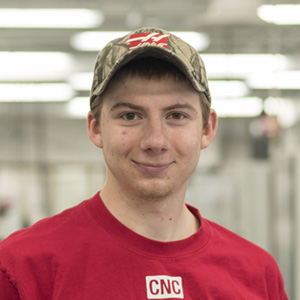Terry may look like a mild-mannered Delta College faculty member. But he has a hidden superpower. While it’s not exactly X-ray vision, it’s close.

“When I’m out, I see all these different products and I know the processes that went into making them,” Terry says. “It’s a mystery to other people – they don’t even think about it.”
Terry has always been interested in how things are put together. He was a tool and die maker after high school, helping build the tools involved in manufacturing. Since then, he’s taught those skills to others, and is now coordinator for Delta’s manufacturing and industrial technology program.
He also coordinates the computer numerical control (CNC) program. CNC involves using computer-driven machines to shape materials to precise dimensions.
“When the economy started to turn around, there was a bigger need for machinists, so we’ve been training in an accelerated format,” he says. “People often come to us to get trained in machine tool because it’s very sustainable.”
What makes the field sustainable? Just look around.
“Everything in your daily life – the clothes you wear, the way you get around, the phone you talk on, the food you eat – is processed or manufactured by a machine,” he says. “That machine is made of hundreds of parts made by individual machinists.”
Manufacturing Excitement
“In the manufacturing industry, you’re always challenged with something new,” Terry says. “I look at teaching the same way. Each student is unique, and I need to present the information in a way that he or she can grasp.”
He succeeds with the help of Delta’s hands-on learning, which involves real manufacturing equipment. In his programs, the ratio of students to machines is 1:1.
Some students in other programs have found the classes so compelling, they have left other fields to pursue a manufacturing-related career.
“Students find it interesting to work with computers in the classroom, and then out on the machines producing the parts they designed,” Terry says. “We have the latest and greatest technology here at Delta. All the theory we learn, we can put into practice.”
When students finish the CNC or manufacturing and industrial technology programs, they are prepared to take further steps toward becoming a machinist. Others go on to areas like engineering, sales and quality control. All of them will likely have a role in making product designs “come to life,” as Terry puts it.
“The clothes you wear, the way you get around, the phone you talk on … it’s all manufactured by machines. Those machines are made of hundreds of parts made by individual machinists.”
Coordinator of CNC and Machine Tool
Before the students get there, Terry enjoys transferring his superpower to them –
seeing the hidden layers in what’s around us. It’s something that’s still fresh after
25 years of teaching.
"I still get excited the night before the first class,” he says. “I’m sure they’re nervous, they can’t sleep the night before. … As a faculty member, I feel the same way.”
Are you interested in pursuing a career in manufacturing or computer numerical control (CNC)? Delta College is the perfect place to start. Apply now.
